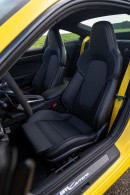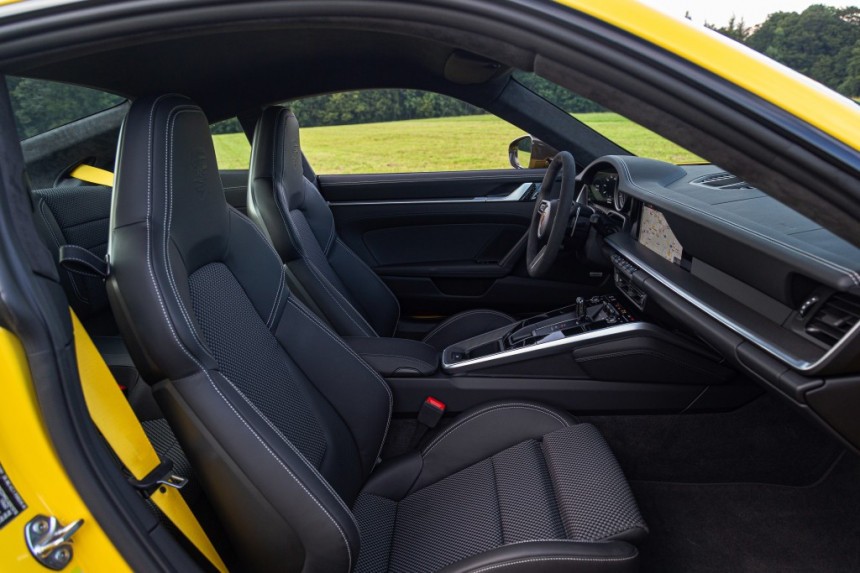The Neunelfer has been hit with a safety recall in the United States to the tune of 910 vehicles produced for the 2023 model year. Said cars feature seatbelt automatic locking retractors that may deactivate earlier than intended, preventing the child restraint system from securing properly.
The potentially affected 911s, therefore, may fail to comply with the requirements underlined by Federal Motor Vehicle Safety Standard 208 for occupant crash protection. Suspect assemblies bear part numbers 992.857.805A, 992.857.805C, and 992.857.806C in the automaker's parts system.
The rear seat three-point seatbelt assemblies come from Joyson Safety Systems Aschaffenburg GmbH. According to documents published on the NHTSA's website, Porsche was informed about said condition in January 2024. On March 6, 2024, dealers will be instructed to check the automatic seatbelt retractor locking mechanisms for both the left- and right-side rear belts. If defective, dealers are required to replace both the left- and right-side assemblies.
Owners can expect to receive Porsche-branded envelopes via first-class mail on or about April 19, 2024. Joyson Safety Systems corrected the aforementioned problem by optimizing the assembly jig on August 4, 2023. What's more, the supplier also enhanced the automated camera-based check at the assembly line on August 16, 2023.
Suspect 911s are 992-gen cars produced at the Zuffenhausen assembly plant between May 12, 2023 and June 29, 2023. Affected versions range from the rear-drive Carrera to the all-wheel-drive Turbo S and the limited-run Edition 50 Years Porsche Design. Revealed with much pomp in January 2022, the Edition 50 Years Porsche Design slots above the Targa 4 GTS in the 911 range.
Both the special edition and the Targa 4 GTS on which it's based use a 3.0-liter boxer with 477 horsepower to its name, resulting in 3.5 seconds from zero to 100 kilometers per hour (62 miles per hour) and 307 kph (191 mph) in terms of top speed. At the other end of the spectrum, the Turbo S needs 2.7 clicks and hits 330 kph (205 mph) on full song.
The eighth-generation 911 will soon receive a mid-cycle refresh. Spied on numerous occasions in a wide variety of versions, the 992.2 will mark the introduction of the first-ever hybrid 911. Reportedly dubbed T-HEV, the self-charging hybrid system is believed to combine an integrated starter generator and an electric drive unit. The latter is allegedly positioned under the fuel tank, for it propels the front wheels and improves weight distribution.
Due in 2026, the 800-plus-horsepower GT2 RS is rumored to be a hybrid as well. Porsche is also expected to launch a 3.6-liter engine, which – in time – would replace the GT3 and Turbo engines. The pre-facelift 992 features a free-breathing 4.0er in GT3 models and a 3.7er in Turbo models.
Porsche is understood to have developed the T-HEV module with the help of Croatian manufacturer Rimac. As you're well aware, Rimac and Bugatti are joined at the hip since November 2021, with Porsche owning 45 percent of the joint venture.
The rear seat three-point seatbelt assemblies come from Joyson Safety Systems Aschaffenburg GmbH. According to documents published on the NHTSA's website, Porsche was informed about said condition in January 2024. On March 6, 2024, dealers will be instructed to check the automatic seatbelt retractor locking mechanisms for both the left- and right-side rear belts. If defective, dealers are required to replace both the left- and right-side assemblies.
Owners can expect to receive Porsche-branded envelopes via first-class mail on or about April 19, 2024. Joyson Safety Systems corrected the aforementioned problem by optimizing the assembly jig on August 4, 2023. What's more, the supplier also enhanced the automated camera-based check at the assembly line on August 16, 2023.
Suspect 911s are 992-gen cars produced at the Zuffenhausen assembly plant between May 12, 2023 and June 29, 2023. Affected versions range from the rear-drive Carrera to the all-wheel-drive Turbo S and the limited-run Edition 50 Years Porsche Design. Revealed with much pomp in January 2022, the Edition 50 Years Porsche Design slots above the Targa 4 GTS in the 911 range.
The eighth-generation 911 will soon receive a mid-cycle refresh. Spied on numerous occasions in a wide variety of versions, the 992.2 will mark the introduction of the first-ever hybrid 911. Reportedly dubbed T-HEV, the self-charging hybrid system is believed to combine an integrated starter generator and an electric drive unit. The latter is allegedly positioned under the fuel tank, for it propels the front wheels and improves weight distribution.
Due in 2026, the 800-plus-horsepower GT2 RS is rumored to be a hybrid as well. Porsche is also expected to launch a 3.6-liter engine, which – in time – would replace the GT3 and Turbo engines. The pre-facelift 992 features a free-breathing 4.0er in GT3 models and a 3.7er in Turbo models.
Porsche is understood to have developed the T-HEV module with the help of Croatian manufacturer Rimac. As you're well aware, Rimac and Bugatti are joined at the hip since November 2021, with Porsche owning 45 percent of the joint venture.






































